| Listing 1 - 10 of 11 | << page >> |
Sort by
|
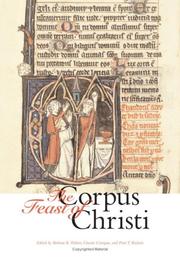
ISBN: 0271029242 9780271029245 Year: 2006 Publisher: University Park Pennsylvania State university press
Abstract | Keywords | Export | Availability | Bookmark
 Loading...
Loading...Choose an application
- Reference Manager
- EndNote
- RefWorks (Direct export to RefWorks)
Sacraments --- anno 1200-1299 --- Corpus Christi Festival. --- Fasts and feasts --- Fête-Dieu --- Fêtes religieuses --- History. --- Histoire --- Juliana, --- Corpus Christi Festival --- 248.159.22 --- Church year --- Devotie tot de Heilige Eucharistie --- 248.159.22 Devotie tot de Heilige Eucharistie --- Fête-Dieu --- Fêtes religieuses
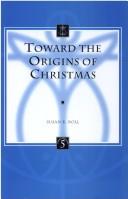
ISBN: 9039005311 9789039005316 Volume: 5 Publisher: Kampen Kok Pharos
Abstract | Keywords | Export | Availability | Bookmark
 Loading...
Loading...Choose an application
- Reference Manager
- EndNote
- RefWorks (Direct export to RefWorks)
Christmas --- Liturgics --- Liturgies, Early Christian --- Noël --- Liturgie --- Liturgie chrétienne primitive --- History. --- History --- Histoire --- 264-041.2 --- -Liturgics --- Liturgiology --- Liturgy --- Public worship --- Liturgies --- Christmas books --- X-mas --- Xmas --- XPmas --- Xtemass --- Church year --- Fasts and feasts --- Holidays --- Kersttijd. Driekoningen. Heilige Familie --- Liturgics. --- 264-041.2 Kersttijd. Driekoningen. Heilige Familie --- Noël --- Liturgie chrétienne primitive --- Jesus Christ --- Date of birth --- Church calendar --- Christmas - History
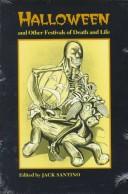
ISBN: 0870498126 0870498134 Year: 1997 Publisher: Knoxville University of Tennessee press
Abstract | Keywords | Export | Availability | Bookmark
 Loading...
Loading...Choose an application
- Reference Manager
- EndNote
- RefWorks (Direct export to RefWorks)
Halloween. --- All Souls' Day. --- Halloween --- Jour des morts --- All Souls' Day --- All Hallows' Eve --- Hallow-Eve --- Manners and customs --- Haunted houses (Amusements) --- Punkie Night --- Day of the Dead --- Día de los Muertos --- Church year --- Fasts and feasts --- Purgatory --- #VCV monografie 1999
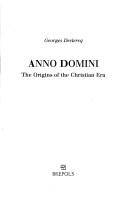
ISBN: 2503510507 2503510515 9782503510514 Year: 2000 Publisher: Turnhout : Brepols,
Abstract | Keywords | Export | Availability | Bookmark
 Loading...
Loading...Choose an application
- Reference Manager
- EndNote
- RefWorks (Direct export to RefWorks)
Calendrier (chronologie) --- Tijdrekening --- Calendar --- Chronology, Historical --- Calendar reform --- Calendrier --- Chronologie historique --- History --- Early works to 1800 --- Histoire --- Ouvrages avant 1800 --- Réforme --- Dionysius Exiguus, --- 930.24 --- Historische chronologie --- Church calendar --- Church history --- Easter. --- History. --- 930.24 Historische chronologie --- Réforme --- Easter --- Church year --- Fasts and feasts --- Holy Week --- Chronology, Ecclesiastical --- Church chronology --- Ecclesiastical chronology --- Calendar, Ecclesiastical --- Computus ecclesiasticus --- Ecclesiastical calendar --- Heortology --- Religious calendars --- Christianity --- Dionysius Syrus, --- Exiguus, Dionysius, --- Syrus, Dionysius, --- Christian church history --- #gsdb8 --- Chronologie --- Calendriers --- Dionysius,
Book
ISBN: 9782503536682 2503536689 9782503539706 Year: 2011 Volume: 10 Publisher: Turnhout Brepols
Abstract | Keywords | Export | Availability | Bookmark
 Loading...
Loading...Choose an application
- Reference Manager
- EndNote
- RefWorks (Direct export to RefWorks)
2010 saw the publication of the Proceedings of the 1st International Conference on the Science of Computus in Ireland and Europe, which took place in Galway, 14–16 July, 2006. That first collection, which had the sub-title Computus and its Cultural Context in the Latin West, AD 300–1200, brought together papers by ten of the leading scholars in the field, on subjects ranging from the origins of the Annus Domini to the study of computus in Ireland c. 1100. All those who participated in the Conference were unanimous that a second, follow-up event should be organized, and that duly took place (also in Galway), 18–20 July, 2008. The proceedings of that Conference are published in this current volume. The topics covered in the 2nd Galway Conference ranged from the general – but vitally important – vocabulary of computus (i.e., the technical terminology developed by computists to describe what they were doing) to the origins of the different systems used to calculate the date of Easter in Antiquity and the Early Middle Ages. In addition, there was discussion also of the great debates about Easter, epitomized by the famous Synod of Whitby in AD 664, and the role of well-known individuals in the evolution of computistical knowledge (e.g., Anatolius of Laodicea, the African Augustalis, Sulpicius Severus, Victorius of Aquitaine, Cassiodorus, Dionysius Exiguus, Willibrord, the ninth-century Irish scholar-exile, Dicuil, as well as the late-tenth century Abbo of Fleury).
Easter --- Church calendar --- Church history --- Calendar --- Calendars --- Astronomy, Medieval --- Pâques --- Calendrier liturgique --- Eglise --- Calendrier --- Calendriers --- Astronomie médiévale --- History --- Chronology --- Histoire --- Chronologie --- 264-11 --- 398.332.12 --- Liturgische kalender. Martelaarsboeken --- Pasen --- Conferences - Meetings --- 398.332.12 Pasen --- 264-11 Liturgische kalender. Martelaarsboeken --- Pâques --- Astronomie médiévale --- Congresses --- Europe --- To 1500 --- Astronomy [Medieval ] --- History. --- Calendar, Ecclesiastical --- Computus ecclesiasticus --- Ecclesiastical calendar --- Heortology --- Religious calendars --- Fasts and feasts --- Church year --- Holy Week --- Christianity
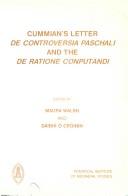
ISBN: 0888440863 9780888440860 Year: 1988 Volume: 86 Publisher: Toronto Pontifical institute of mediaeval studies
Abstract | Keywords | Export | Availability | Bookmark
 Loading...
Loading...Choose an application
- Reference Manager
- EndNote
- RefWorks (Direct export to RefWorks)
Easter. --- Church calendar --- Pâques --- Calendrier liturgique --- Easter --- History. --- 264-041.61 --- -Church calendar --- -Calendar, Ecclesiastical --- Computus ecclesiasticus --- Ecclesiastical calendar --- Heortology --- Religious calendars --- Calendar --- Fasts and feasts --- Church year --- Holy Week --- Pasen --- History --- Christianity --- Ireland --- Irish Free State --- Religious life and customs. --- -Pasen --- 264-041.61 Pasen --- -264-041.61 Pasen --- Calendar, Ecclesiastical --- Pâques --- Easter - Ireland - History. --- Church calendar - Ireland - History. --- Cumianus Longus ab. Clonfertensis --- Cummianus (Cumianus) Fada (Longus) ab. Clonfertis
Book
ISBN: 9780199543120 0199543127 0191720062 9786611978679 1281978671 019156236X Year: 2008 Publisher: Oxford ; New York : Oxford University Press,
Abstract | Keywords | Export | Availability | Bookmark
 Loading...
Loading...Choose an application
- Reference Manager
- EndNote
- RefWorks (Direct export to RefWorks)
The system of numbering the years AD (Anni Domini, Years of the Lord) originated with Dionysius Exiguus. Dionysius drafted a 95-year table of dates for Easter beginning with the year 532 AD. Why Dionysius chose the year that he did to number as '1' has been a source of controversy and speculation for almost 1500 years. According to the Gospel of Luke (3.1; 3.23), Jesus was baptized in the 15th year of the emperor Tiberius and was about 30 years old at the time. The 15th year of Tiberius was AD 29. If Jesus was 30 years old in AD 29, then he was born in the year that we call 2 BC. Most ancient authorities dated the Nativity accordingly.Alden Mosshammer provides the first comprehensive study of early Christian methods for calculating the date of Easter to have appeared in English in more than one hundred years. He offers an entirely new history of those methods, both Latin and Greek, from the earliest such calculations in the late second century until the emergence of the Byzantine era in the seventh century. From this history, Mosshammer draws the fresh hypothesis that Dionysius did not calculate or otherwise invent a new date for the birth of Jesus, instead adopting a date that was already well established in the Greek church. Mosshammer offers compelling new conclusions on the origins of the Christian era drawing upon evidence found in the fragments of Julius Africanus, of Panodorus of Alexandria, and in the traditions of the Armenian church.
Easter --- Church calendar --- Church history --- History --- Dionysius Exiguus, --- Chronology --- -930.24 --- Calendar, Ecclesiastical --- Computus ecclesiasticus --- Ecclesiastical calendar --- Religious calendars --- Holy Week --- Dionysius Syrus, --- Exiguus, Dionysius, --- Syrus, Dionysius, --- 930.24 --- Church year --- Fasts and feasts --- Chronology, Ecclesiastical --- Church chronology --- Ecclesiastical chronology --- Heortology --- Calendar --- 930.24 Historische chronologie --- Historische chronologie --- Christianity --- Easter. --- History. --- Church calendar - History --- Church history - Chronology --- Pâques --- Ère chrétienne --- Dionysius Exiguus, - d. ca. 540 --- Church calendar - History. --- Dionysius Exiguus, - d. ca. 540. --- Dionysius,
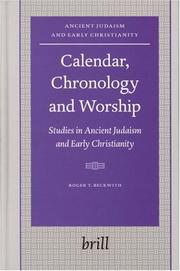
ISBN: 9004146032 9047415477 9789004146037 Year: 2005 Volume: v. 61 Bd. 61. Publisher: Leiden ; Boston : Brill,
Abstract | Keywords | Export | Availability | Bookmark
 Loading...
Loading...Choose an application
- Reference Manager
- EndNote
- RefWorks (Direct export to RefWorks)
This book takes as its theme the related issues of calendar, chronology and worship, as they were conceived and practised in ancient Jewish and early Christian times. After a general discussion of the way the three issues are related, there follow six chapters on the calendar, first the standard Jewish calendar, then the Qumran calendar (giving particular attention to the Book of Enoch and the Temple Scroll) and finally the Christian calendar - both the standard Christian calendar and that observed by the Montanists. Three chapters on chronology come next, one of them offering a chronological solution to a puzzling calendrical problem in the Dead Sea Scrolls, another relating Jewish eschatological expectations to New Testament teaching, and a third examining the chronological calculations of the Hellenistic Jew Demetrius, the Testaments of the Twelve Patriarchs, and the Book of Jubilees. The three concluding chapters, on worship, include an investigation of the historical development of the Psalter and a careful survey of the relationship between ancient Jewish worship and early Christian. The book discusses a variety of issues that arise in modern biblical, intertestamental and patristic study, some neglected, some very controversial, and throws new light upon them.
Chronologie [Joodse ] --- Chronologie hébraique --- Chronologie juive --- Chronology [Hebrew] --- Chronology [Jewish] --- Hebreeuwse chronologie --- Hebrew chronology --- Jewish chronology --- Joodse chronologie --- Jewish calendar --- Church year --- Worship (Judaism) --- Worship --- Calendrier juif --- Année liturgique --- Cultes juifs --- Cultes --- History --- Histoire --- Bible --- Dead Sea scrolls. --- Criticism, interpretation, etc. --- Calendar, Jewish --- Chronology, Jewish. --- Année liturgique --- Criticism, interpretation, etc --- Dead Sea Scrolls --- To 1500 --- Primitive and early church, ca. 30-600 A.D. --- Jewish chronology. --- Church year. --- Jewish calendar. --- Calendar, Hebrew --- Hebrew calendar --- Calendar --- Judaism --- Church history --- Chronology, Jewish --- Chronology --- Jews --- Christian year --- Ecclesiastical year --- Heortology --- Liturgical year --- Year, Church --- Church calendar --- Fasts and feasts --- Early church. --- Primitive and early church --- Bible. --- Jerusalem scrolls --- ʻAin Fashka scrolls --- Jericho scrolls --- Scrolls, Dead Sea --- Qumrân scrolls --- Rękopisy z Qumran --- Shikai bunsho --- Megilot Midbar Yehudah --- Dodezee-rollen --- Kumránské rukopisy --- Documentos de Qumrán --- Textos de Qumrán --- Rollos del Mar Muerto --- Manuscritos del Mar Muerto --- Manuscrits de la mer Morte --- Dödahavsrullarna --- Kumranin kirjoitukset --- Kuolleenmeren kirjoitukset --- Qumranhandskrifterna --- Qumranin kirjoitukset --- Qumran Caves scrolls
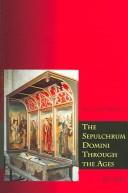
ISBN: 9042909528 9789042909526 Year: 2000 Volume: 10 Publisher: Leuven Peeters
Abstract | Keywords | Export | Availability | Bookmark
 Loading...
Loading...Choose an application
- Reference Manager
- EndNote
- RefWorks (Direct export to RefWorks)
Liturgy --- Christian fundamental theology --- Christian church history --- Arts religieux --- Liturgie --- Religieuze kunst --- Holy Sepulcher --- Easter --- Saint Sépulcre --- Pâques --- History --- History of doctrines --- Histoire --- Histoire des doctrines --- Public Worship. Sacraments. --- Church History. --- History. --- History of doctrines. --- 247.3 --- 264-041.52 --- -Holy Sepulcher --- -Sepulcher, Holy --- Shrines --- Church year --- Fasts and feasts --- Holy Week --- Kerkmeubilair: beelden; grafmonumenten; ikonen; reliekhouders; tribunes --- Palmzondag. Goede week. Witte donderdag. Goede vrijdag --- -History of doctrines --- -Kerkmeubilair: beelden; grafmonumenten; ikonen; reliekhouders; tribunes --- 264-041.52 Palmzondag. Goede week. Witte donderdag. Goede vrijdag --- 247.3 Kerkmeubilair: beelden; grafmonumenten; ikonen; reliekhouders; tribunes --- -264-041.52 Palmzondag. Goede week. Witte donderdag. Goede vrijdag --- Sepulcher, Holy --- Saint Sépulcre --- Pâques --- Liturgy&delete& --- Holy Sepulcher - History. --- Easter - Liturgy - History of doctrines.
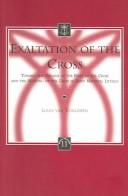
ISBN: 904290951X 9789042909519 Year: 2000 Volume: 11 Publisher: Leuven Paris Peeters
Abstract | Keywords | Export | Availability | Bookmark
 Loading...
Loading...Choose an application
- Reference Manager
- EndNote
- RefWorks (Direct export to RefWorks)
Geschiedenis van de Middeleeuwen --- Histoire du Moyen Age --- Liturgie --- Spiritualiteit --- Spiritualité --- Feast of the Cross --- Holy Cross --- Spirituality --- Public Worship. Sacraments. --- Liturgy --- History and criticism. --- Legends. --- History --- 264-047 --- -Holy Cross --- -Spirituality --- -Spiritual-mindedness --- Philosophy --- Religion --- Spiritual life --- Cross --- Cross, Feast of the --- Encaenia --- Feast of the Exaltation of the Cross --- Feast of the Holy Cross --- Feast of the Invention of the Holy Cross --- Holy Cross, Feast of the --- Meskel --- Church year --- Fasts and feasts --- Kruisvinding. Kruisverheffing. Feesten van het kerkelijk jaar--(andere) --- -History and criticism --- Legends --- -264-047 --- -Kruisvinding. Kruisverheffing. Feesten van het kerkelijk jaar--(andere) --- 264-047 Kruisvinding. Kruisverheffing. Feesten van het kerkelijk jaar--(andere) --- -Feast of the Cross --- -264-047 Kruisvinding. Kruisverheffing. Feesten van het kerkelijk jaar--(andere) --- Spiritual-mindedness --- -Exaltation de la sainte Croix, Fête de l' --- Sainte Croix --- Exaltation de la sainte Croix, Fête de l' --- Spiritualité --- Liturgy&delete& --- History and criticism --- Christian spirituality --- anno 500-1499 --- Histoire et critique --- Légendes --- Histoire --- Feast of the Cross - Liturgy - History and criticism. --- Holy Cross - Legends. --- Spirituality - Europe - History - Middle Ages, 600-1500.
| Listing 1 - 10 of 11 | << page >> |
Sort by
|

 Search
Search Feedback
Feedback About
About Help
Help News
News